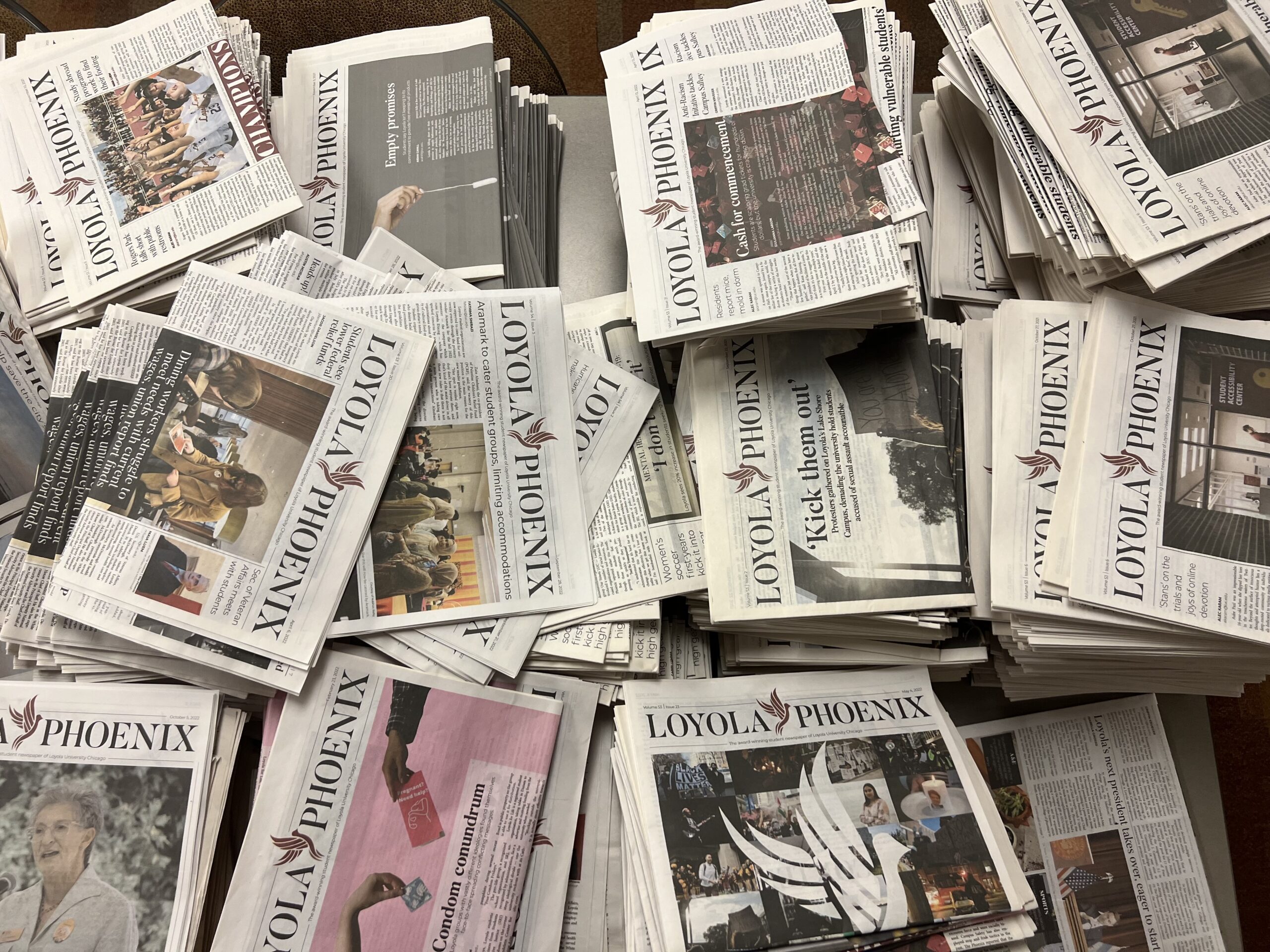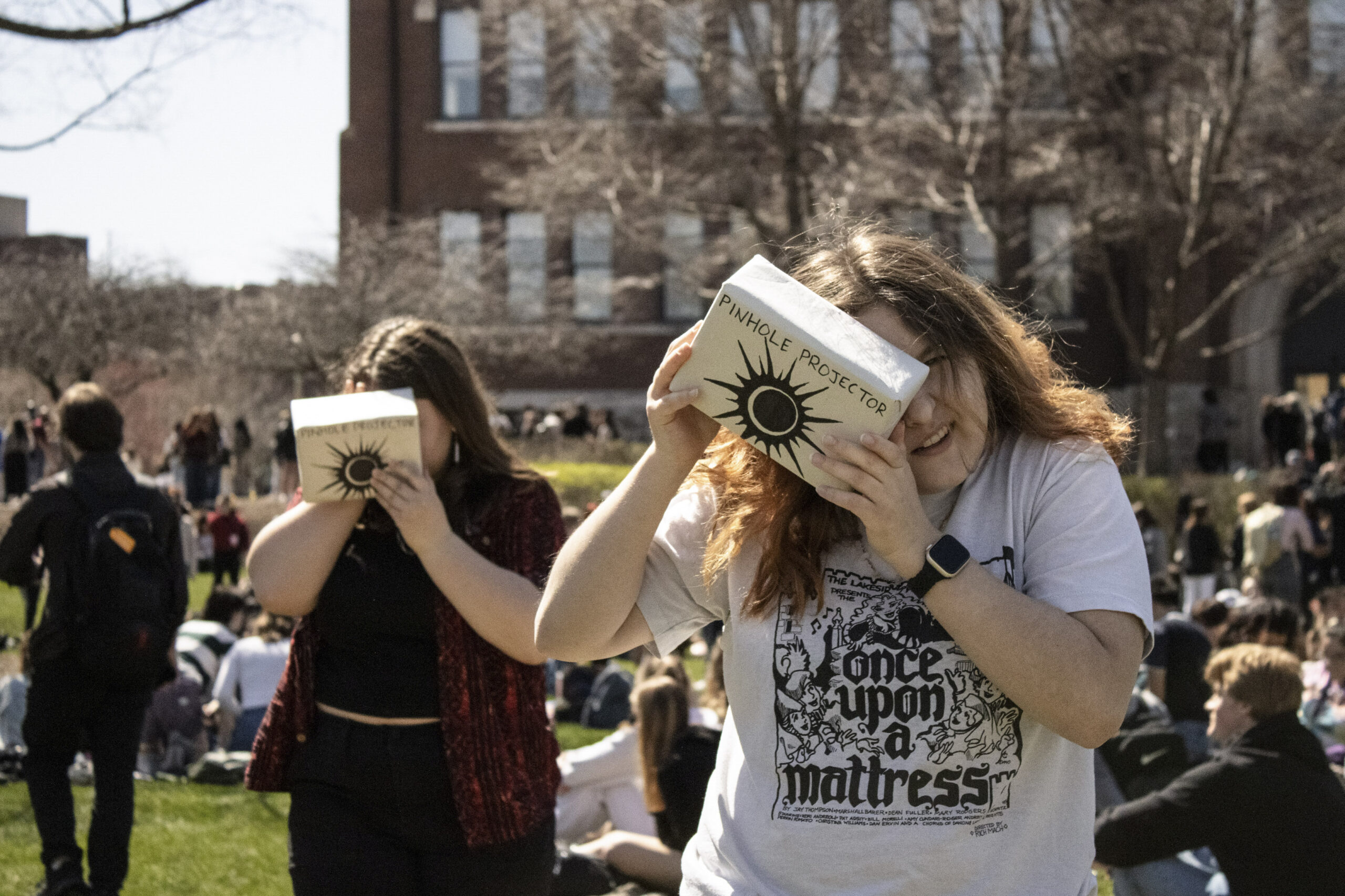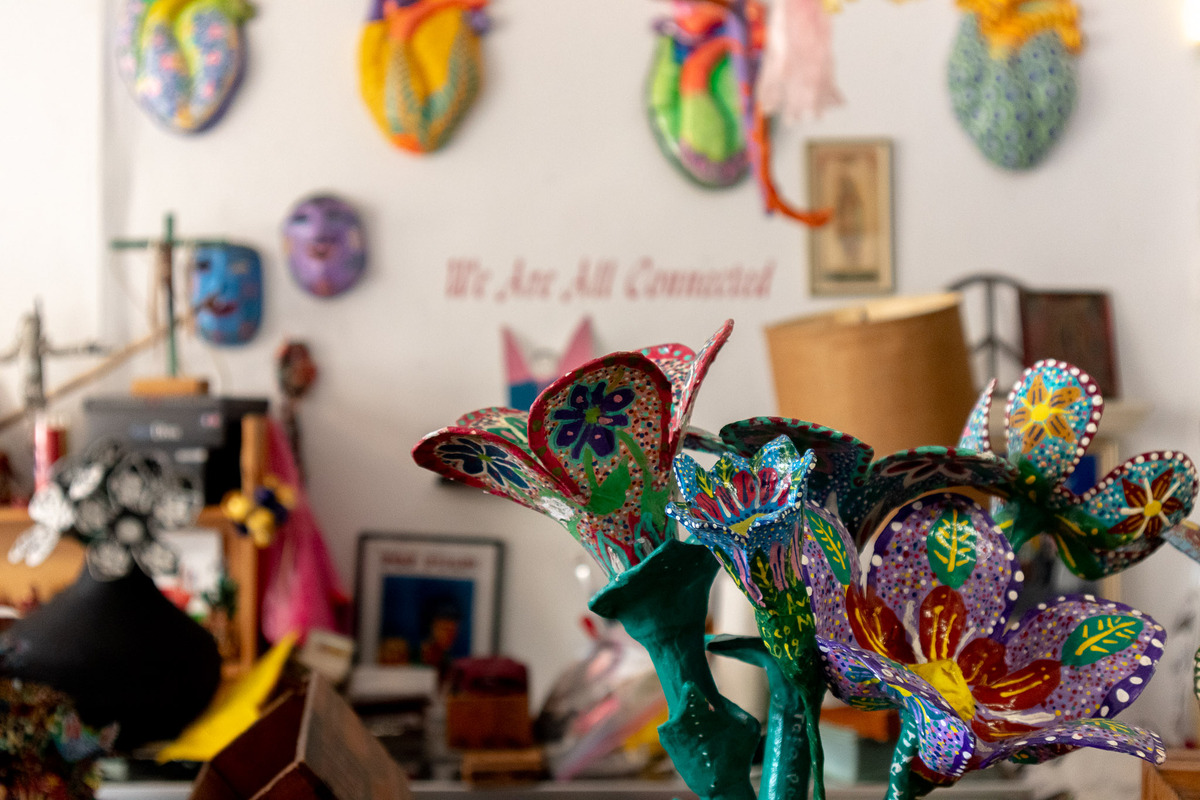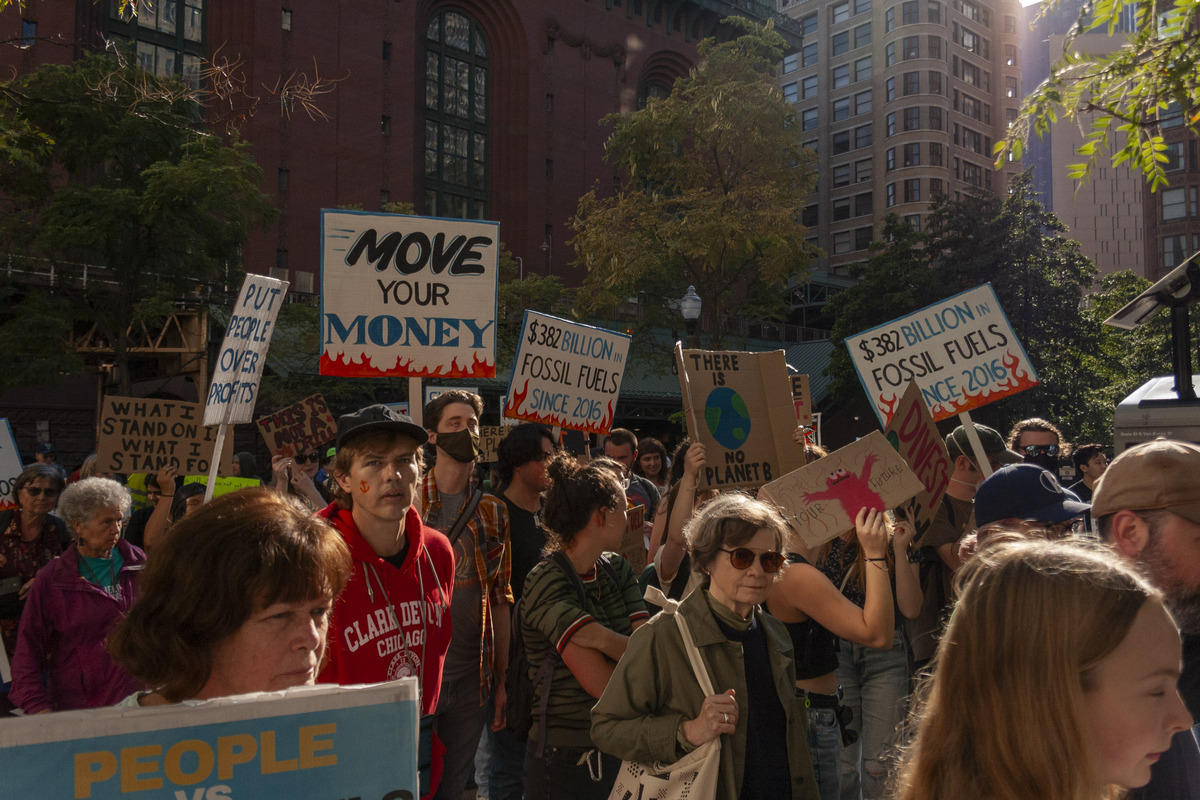Every piece in the ShadowBall Fashion Show, organized by Chicago non-profit organization Triveni Institute, was made primarily or entirely from trash and thrifted items.
Pollution Turned Posh: Triveni Institute Hosts Sustainable ShadowBall Fashion Show

Content warning: Addiction
A stiffened black and white gown sways as the model walks elegantly down a spotlit runway. The flashing of cameras finally reveal the dress’ material — layers of plastic grocery bags. A dress made of trash.
Every piece in ShadowBall fashion show, organized by Chicago non-profit organization Triveni Institute, was made primarily or entirely from trash and thrifted items. The Jan. 20 show was held at Macy’s on State Street and featured two fashion lines, one created by a variety of designers and the other by Scottie Rae Eskulund, the show’s feature designer.
“It’s important to pay attention and ask hard questions,” Eskulund said. “Take the time to stop and address problems so we can save ourselves and our planet.”
The organization works to mitigate plastic pollution, promote environmental and social justice, and uplift storytelling through the arts, according to Jordan Parker, the executive director of Triveni.
“Triveni is a word in Hindi that means ‘three,’ and a lot of the things we do can be explained in threes,” Parker said. “We want to do work at the intersection of environmental health, physical health and mental health.”
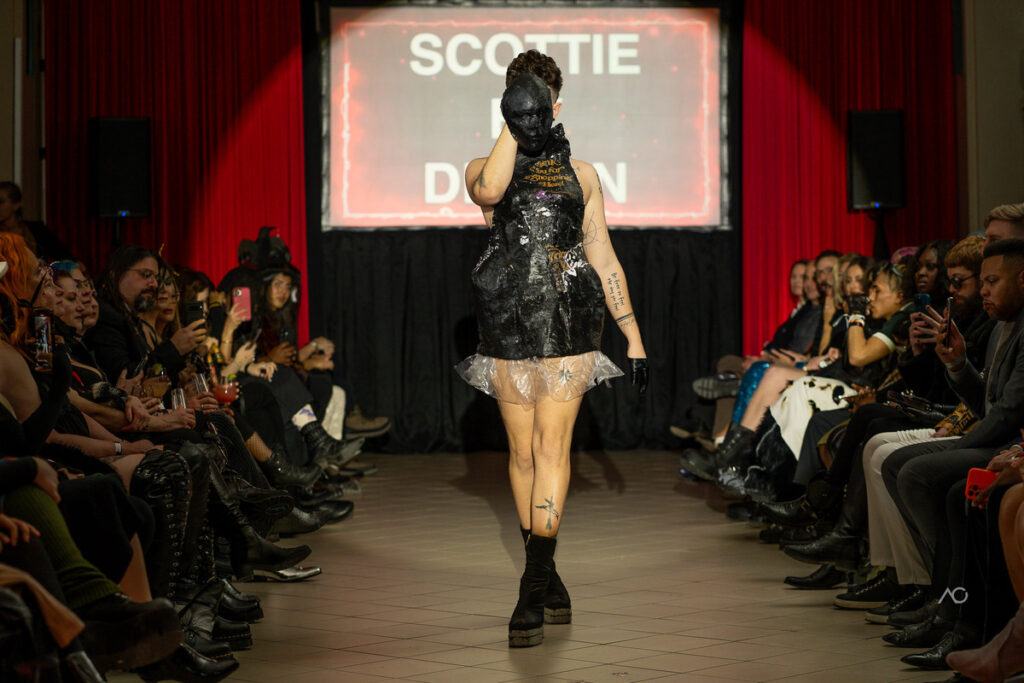
When it came to planning this year’s fashion showcase, Parker said the show would discuss mental health and the concept of the “shadow self,” in addition to its social justice and sustainability messaging.
“Our personal shadows are causing major damage behind the scenes,” Parker said. “Our societal shadows are waste and pollution.”
Rather than continuing to brush these unwanted pieces of society under the rug, Parker said ShadowBall sought to bring mental afflictions to light while recognizing their significance and mitigating their potential for harm.
Each designer took a unique approach to tackling these heavy topics. One designer, Vicky Zuniga, created garments either entirely white or black. Mirrors stitched into the garments reflected the flashing lights of the cameras as the models approached the runway’s end.
“I wanted my designs to embody both sides,” Zuniga said. “We’re all light as well, we need darkness to know what light is.”
Her designs featured intricate beadwork, hand-woven. This process proved extremely difficult as many of her beads were sourced from landfills and had small plastic components, according to Zuniga.
Cat Barr participated in ShadowBall as a designer and model. She wore a black dress with a cape made of discarded fishing nets. Trapped beneath her wired cape were photos of sea-life swimming in crystal blue waters.
“My look took a lot of thought, work and passion,” Barr said. “The ocean needs our help.”
Feature Designer Scottie Rae Eskulund created 12 different garments that each symbolize a common mental health struggle or “shadow.” Apart from designing, Eskulund’s work as a therapist lends itself to this year’s theme of mental health.
One of Eskulund’s designs titled “Addiction” consisted of a dress of woven cigarette butts with a choker made of empty orange prescription bottles. The dress aimed to reflect the mental turmoil of addiction.
“Fashion is a true means of expression,” Eskulund said. “It impacts how you’re perceived by others and reflects how you perceive yourself.”
Triveni’s journey with fashion as a form of advocacy began in 2023 with Trashion Revolution, where designers also transformed plastic waste into stylish designs. Triveni aimed to raise awareness of plastic pollution and its relationship to social justice and gender diversity, Parker said. The show included 36 Chicago-based designers who collectively constructed 50 creations, according to Parker.

“People are siloed in their causes, and the environmental sector is no exception,” Parker said. “I immediately gravitated towards having an event and throwing a party to create spaces in order to deliver some heavier material.”
Diverse communities are burdened by environmental decline, and Parker said they wanted Trashion Revolution to feature models from these communities. This was done through an intentional casting process, according to Parker.
Some designs were featured in other shows like the Blue Wave Fest, a political fundraising effort hosted at Theater on the Lake, and the World Fashion Festival, held at Macy’s on State Street. To promote World Fashion Festival, Triveni looks were displayed at Columbia College Chicago.
“It was super cool to drive down Michigan Avenue and see Trashion Revolution looks in the windows,” Parker said.
In the future, Parker said the organization hopes to continue on this positive trajectory of promoting plastic pollution awareness while branching out further into the environmentalist community.
Parker plans for the Triveni Institute to host two fashion showcases each year.
“We can use fashion and art as mediums to discuss these really complex uncomfortable topics,” Parker said.
Triveni’s first fashion show in 2023 partially relied on a grant from the Center for Health and Environmental Justice, according to Parker. Now the roles are switched, and Parker said Triveni has the means to help other organizations in their infancy.
“We want to be able to offer microgrants to grassroots activists who are doing really important work in their communities, specifically for the youth,” Parker said.
Spotlights and flashing cameras on the runway of the ShadowBall shone a light on plastic pollution, social justice and mental health, according to Parker. But actual change is in the hands of the audience.
“We ultimately want to inspire action,” Parker said. “That’s how we’ll address these massive problems of our time.”
Featured image courtesy of Alexander Callejo



